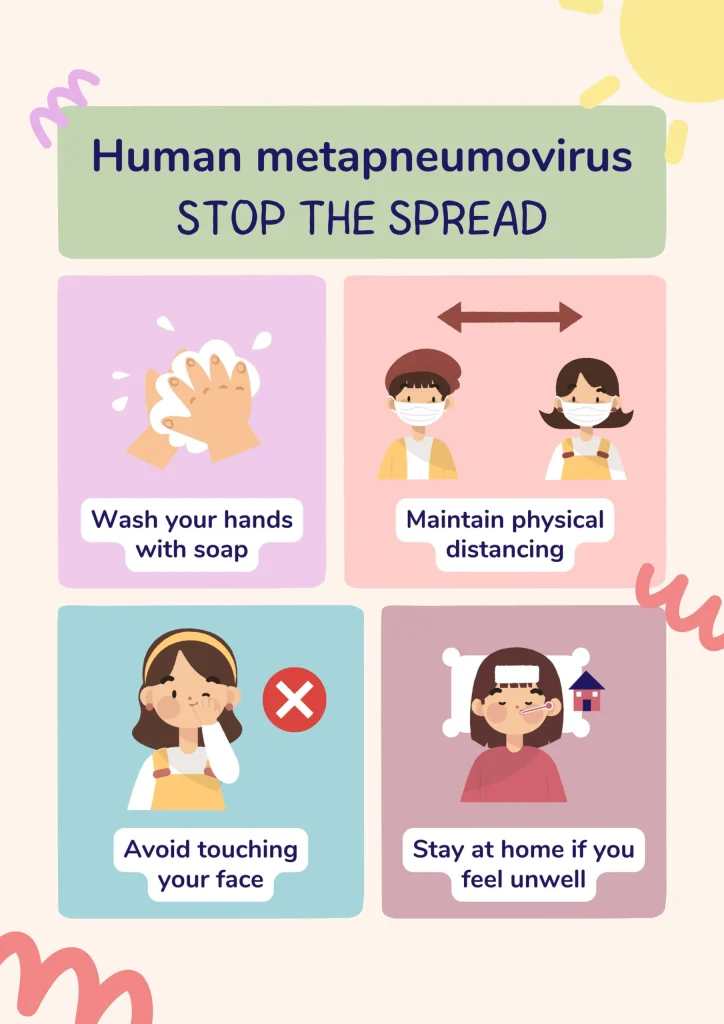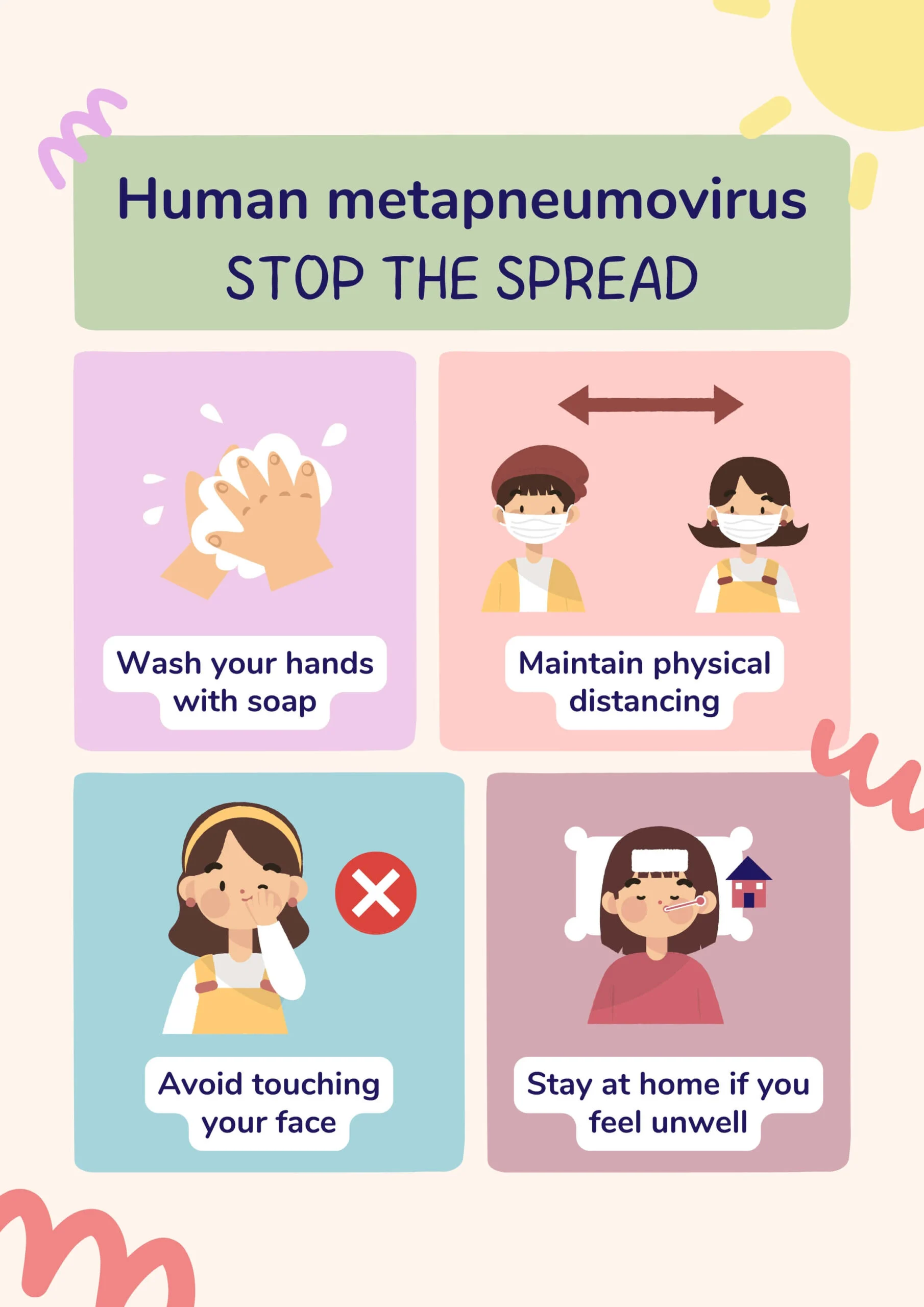Media Health Group has a sole dedication to improving the understanding of the public when it comes to health issues through easy access and data supported information. We are passionate about educating and helping people, their families and their communities to make the best decisions about their health.
Human Metapneumovirus also known as (hMPV) can be termed as a respiratory virus that is easy to contact and affects people of different age groups. Since it was discovered in 2001 by research specialists in the Netherlands, it has been seen as a huge causative factor of infections in the lower respiratory tract all over the world. hMPV can be found under the family of Paramyxoviridae, and it has so many similarities with the Respiratory Syncytial Virus (RSV).
Despite the fact that some infections are known to be less severe, hMPV is known to bring about chronic illness in both children, adults and people that have a weak immune system. As of recently, it is known to be one of the top viral causes of pneumonia and bronchiolitis in infants, but it comes after RSV.
The primary method of transferring Human metapneumovirus from one person to another is through the following:
- When liquid from the respiratory tract is brought out during sneezing or coughing
- When you are in close contact to people that are infected especially in house settings or even daycare
- When you have direct contact with objects or hands that are contaminated
It is important to know that this virus can survive for many hours on surfaces that are hard and can also be transmitted indirectly by objects like utensils, toys and even devices that are being shared.
The outbreaks of this virus are more likely to happen in either spring or late winter, they can differ by region but they tend to overlap with other respiratory viruses.
Note that the symptoms of hMPV have a very huge resemblance to other viral respiratory illnesses and they differ based on status of health and age. After being exposed, the incubation period is usually around 4 to 6 days.
- Loss of appetite
- Runny or blocked nose
- Muscle pain
- Dry or wet cough
- Chills and fever
- Headache
- Sore throat
- Difficulty with breathing
- Serious fatigue or lethargic reaction
- Quick breathing
- Dehydration
- Bluish face or lips
- Consistent fever
In the case of children, they might have symptoms like poor feeding, irritable moods and apnea.
Despite the fact that there are some people with good immune system that usually get their health back within a week, there are also such a set of people that are much more susceptible to this virus and they include:
- Children of age 5 and under particularly babies that are under 12 months
- People that received a transplant and are taking immunosuppressive drugs
- Older adults that are over the age of 65
- People that are immunocompromised, especially those that are taking chemotherapy and have HIV and AIDS
- People that have COPD, asthma, or different other severe respiratory diseases
They are prone to be at a much higher risk of issues like bronchiolitis, pneumonia or respiratory failure, which usually requires hospital checkup.
Due to the fact that the symptoms of hMPV are similar to other infections of the respiratory system, it is very important for the proper diagnosis to take place in a laboratory. The different methods of testing include:
- RT-PCR also known as reverse transcription-polymerase chain reaction is the most popular method that is used to find out hMPV and RNA using swabs from the nose or the throat.
- Chest X-ray which would help to discover any inflammation of the lung or if there was a fluid accumulation in chronic cases.
- Immunofluorescence or antigen tests are actually less sensitive but it is also carried out in most hospital laboratories.
It is very important to carry out diagnosis on time because that would help to give the best care and also tick off bacterial infections like influenza or SARS-CoV-2.
Note that there has been zero certified antiviral medication for human metapneumovirus. There is only the option of managing the virus which is mainly centred on symptom relief and ensuring that there is hydration and oxygenation.
- It is important to have saline nasal drops and humidifier that would help to relieve congestion
- Make use of antipyretics such as ibuprofen and acetaminophen
- Ensure to rest and take a lot of fluid
- Supplementation of oxygen
- In the case of severe cases, mechanical ventilation is advised
- Intravenous fluids
You should only be prescribed antibiotics if there is proof that there is a presence of a bacterial infection that is on the secondary level.
There has been proven research that hMPV is the biggest causative factor for about 5% to 15% of all medical cases for acute respiratory infections in children all over the world. It has also been discovered to be the main reason why there are a lot of visits to the paediatric ER, particularly in countries that are developing and have limited healthcare systems.
In the case of adults and immunocompromised communities, hMPV has been able to beat influenza when it comes to how chronic it is, and that is why it is important for there to be proper awareness and ways to prevent it all over the world.
As of the moment, there is no vaccine that has been licensed but there has been great progress in current research and studies. Some research specialists are currently checking out options like:
- Live reduction and disabled vaccines
- Monoclonal antibodies, especially for patients that are at high risk
- Platforms gotten from Vector such as mRNA or adenovirus
Due to the fact that the virus is similar to RSV, the progress in the development of the vaccine for RSV could also mean a breakthrough for hMPV.

While the search for a vaccine is still active, it is important to carry out preventive measures based on personal hygiene and just normal life practices and these includes:
- Proper and frequent cleansing of hands
- Constant wearing of facemasks in the healthcare sector or even crowded spaces when there is an outbreak
- Cease all close or direct contact with infected people
- Separate children and immunocompromise people from crowds, especially when there is an outbreak
- Proper use of disinfectants on hard surfaces on a regular basis
It is also important to inform and educate health care workers on how to help in the reduction of this virus in nursing homes, hospitals, and even children care centre.
Q1: Can hMPV cause complications in the long run?
A huge number of people make a recovery without any lingering effects but for people that have lung conditions that have pre-existed, they might experience persistent infections or even scarring of the lungs.
Q2: How does hMPV vary from COVID-19?
Despite the fact that both of them are viruses of the respiratory system, hMPV can be seen as a paramyxovirus, and not a coronavirus. There might be an overlap in their symptoms but the symptoms of COVID-19 usually come with loss of smell and taste and have a wider impact on the system.
Q3: Is there a case of cross-immunity between RSV and hMPV?
No, even though they have similar characteristics, if you are immune to one virus, it doesn’t necessarily mean that you would be immune to the other.
Q4: Can hMPV co-infect with other viruses?
Yes, it is common to have co-infections with RSV, influenza or even bacterial pathogens and it might also make the illness more severe.
Q5: How is hMPV monitored by public health organizations?
In so many countries, there is a respiratory surveillance program that monitors hMPV with other viruses like RSV and flu. there is a very close monitoring situation by the WHO, CDC and other sectors, especially during huge outbreaks.
It is safe to say that Human Metapneumovirus is a hugely additive factor to respiratory disease all over the world. Despite the fact that it is normally overwhelmed by influenza and RSV, it still has a lot of effect on illnesses, especially in countries that are vulnerable and it is necessary to be aware of how to manage the outbreaks.
By having good personal hygiene and being aware of this virus, that is the only way to stay safe because there is no current vaccine for it. While there is ongoing research, Media Health Group is focused on giving the best, accurate and helpful health information.
